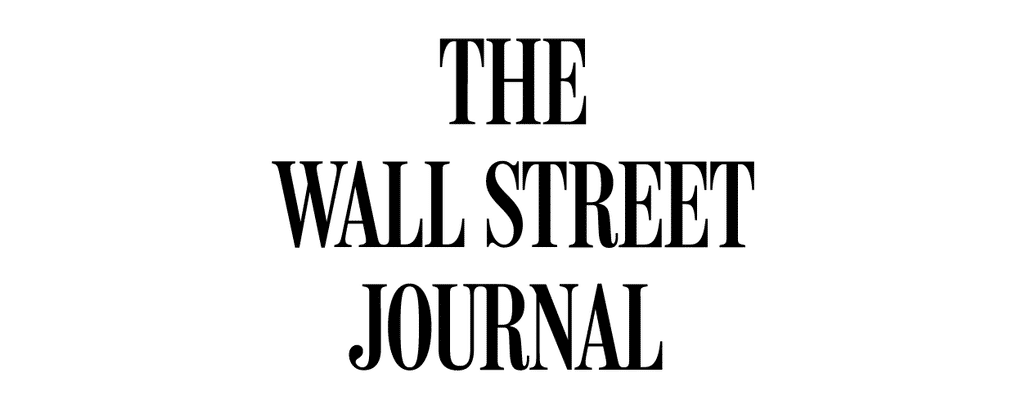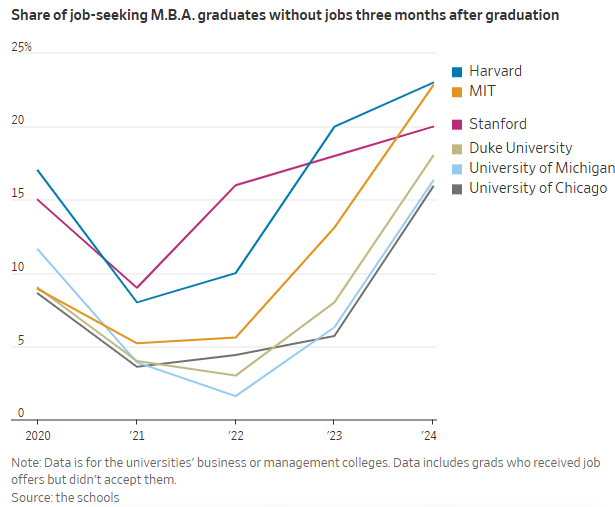
Comments by—Kent Elliott, Principal at RETS Associates
“Thinking of an MBA or MRED? Knowledge is power. Read this article to learn about the challenges that job seekers in top MBA programs (not real estate specific) are experiencing. The real estate industry pays for experience. Not education. There are exceptions. But we believe the statement is 90%+ applicable.”
By Lindsay Ellis Link to Original Article Here
Landing a professional job in the U.S. has become so tough that even Harvard Business School says its M.B.A.s can’t solely rely on the university’s name to open doors anymore.
Twenty-three percent of job-seeking Harvard M.B.A.s who graduated last spring were still looking for work three months after leaving campus. That share is up from 20% the prior year, during a cooling white-collar labor market; the figure was 10% in 2022, according to the school.
“We’re not immune to the difficulties of the job market,” said Kristen Fitzpatrick, who oversees career development and alumni relations for HBS. “Going to Harvard is not going to be a differentiator. You have to have the skills.”
Harvard isn’t the only elite business school where recent grads seem to be stumbling on their way into the job market. More than a dozen top-tier M.B.A. programs, including those at the University of Pennsylvania’s Wharton School, Stanford’s Graduate School of Business and New York University’s Stern School of Business, had worse job-placement outcomes last year than any other in recent memory.
Most M.B.A.s from top schools end up with good-paying jobs, and school officials say they have an edge in the white-collar job market. But the three-month figure is closely watched because it signals hiring demand for corporate climbers in high-wage fields and it usually gives schools a statistic to woo young professionals into investing in a management degree.
Ronil Diyora, from Surat, India, received his M.B.A. from the University of Virginia’s top-ranked Darden School of Business last spring, aiming to change careers from manufacturing operations to technology. Diyora, 30, said he has applied to at least 1,000 jobs so far and attends networking meetups in San Francisco, but wonders if he was naive about changing industries. Graduates who need visa sponsorship by employers accepted jobs at lower rates than American students at several programs, school data show.
“Ask me in two years,” Diyora said of whether his graduate degree was worth it.
One school improved hiring
The share of 2024 M.B.A.s still on the market months after graduation more than doubled at most highly ranked business schools when compared with 2022, according to a Wall Street Journal analysis of school data. At some, including the University of Chicago’s Booth School and Northwestern University’s Kellogg School, the share of students still looking more than tripled.
Staff have helped students find jobs for months after graduation, Chicago and Northwestern leaders say.
“Nobody gets left on the field,” said Liza Kirkpatrick, assistant dean for the career center at Kellogg, noting that while 13% of job-seeking M.B.A. grads didn’t have a job after three months, that figure fell to 8% at five months.
One high-ranking program had more 2024 graduates employed by fall than it did in 2023: Columbia Business School. M.B.A.s who land jobs tend to get sizable pay, with median base starting salaries of about $175,000, school data show.

Employers don’t hire as many M.B.A. grads during the school year, a tactic that was common two years ago. Now, they recruit smaller numbers closer to graduation—and afterward, according to staff at Columbia and the University of Michigan.
In this environment, students need to engage with professors and alumni, not just the career center or recruiters, said Susan Brennan. She leads career development at MIT’s Sloan School of Management, where 22.8% of M.B.A.s were hunting three months after graduation. Brennan said that when graduates who launch startups or return to past employers are factored in, the overall group of M.B.A.s who haven’t accepted jobs is smaller.
Recruiters vanish
Amazon, Google and Microsoft have reduced M.B.A. recruiting, as have consulting firms, recent graduates and business school staff said.
McKinsey, for example, cut its M.B.A. hires at Booth to 33, down from 71 the prior year, the school said. Google and Amazon spokespeople said they continue to recruit M.B.A.s, but the number of hires fluctuates with business needs. Microsoft said it has slightly cut back M.B.A. hiring.
Jenny Zenner, a senior director at UVA Darden’s career center, said she’s seeing less tech hiring across M.B.A. programs. (At Darden, 10% of graduates hadn’t accepted a job three months after graduation, up from 5% in 2023.) Many tech recruiters lost their jobs, and companies dialed back their internship programs, fundamentally changing how they hire from universities, she said.
“Companies tell us, ‘We’re not coming to campus anymore,’” Zenner added.
The super-selective environment isn’t a blip, but a new reality, HBS’s Fitzpatrick said.
“I don’t think it’s going to change,” she said.
To help students and alumni, Harvard is testing an artificial-intelligence tool that can compare job seekers’ résumés with their preferred roles and recommend online classes to bridge skills gaps. HBS is also offering students a new four-day intensive class on the job search, focusing on soft skills such as networking and how to pitch your skill set.
‘Am I good enough?’
Newly minted M.B.A.s still on the market say they are watching their budgets and taking contract work. Even graduates who secured jobs have had their plans upended.
Yvette Anguiano got a consulting offer from EY-Parthenon after a summer internship while a student at Kellogg. Last September, she moved to Seattle for the job, only for her start date to be pushed to June 2025.
“I was pretty devastated,” she said. “I had tried to do everything right.”
Anguiano is out of savings, and student-loan payments are looming. The firm gave her a stipend of $35,000, far less than her starting salary, and she’s looking for work to bridge the gap. EY-Parthenon didn’t respond to requests for comment.
Nikhil Sreekumar graduated last spring from Duke University’s Fuqua School of Business, where 18% of job-seeking M.B.A.s were still looking. He applied to about 500 jobs before a Duke alum referred Sreekumar to Amazon for a senior program manager job. He starts this month.
“You constantly ask yourself, Am I good enough?” he said of his protracted job hunt. “I was so relieved.”
Write to Lindsay Ellis at lindsay.ellis@wsj.com
We’d love to hear your thoughts on this topic. How do you perceive the balance between education and experience in your career? Share your experiences and join the discussion below.
—Kent Elliott, RETS Associates


